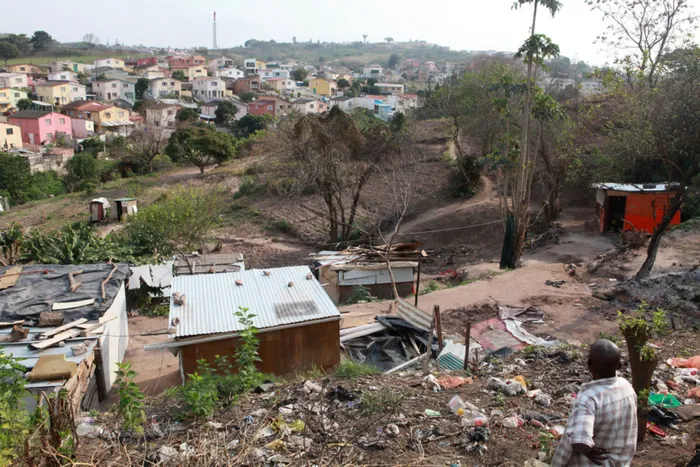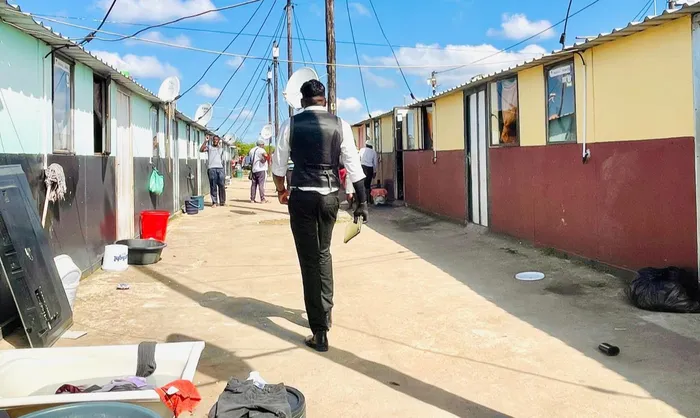When location matters more than quality housing

The Bottlebrush informal settlement sprung into life in the 1980s, after the floods hit Montford. File picture: Siyanda Mayeza/Independent Media The Bottlebrush informal settlement sprung into life in the 1980s, after the floods hit Montford. File picture: Siyanda Mayeza/Independent Media
Image: Siyanda Mayeza/Independent Media
TO UNDERSTAND housing policies in practice, one must walk the footpaths of the communities they intend to serve. In my own journey across South Africa, I have visited countless neighborhoods where the grand promises of the Constitution meet the grit of everyday survival.
One such place is the Bottlebrush Community in KwaZulu-Natal, an informal settlement tucked behind Crossmoor and Shallcross in Durban’s Chatsworth area.
Bottlebrush sprang up in the 1980s, when floods displaced people, mainly Indian, in nearby formal townships, and desperate families grabbed a patch of vacant land rather than be shunted to distant government camps.
Today, Bottlebrush is a sprawling shantytown of an estimated 19 000+ residents, many drawn from rural South Africa and even neighbouring countries by the magnetic hope of the city.
The settlement sits cheek-by-jowl with the formerly established Indian suburbs, a poignant symbol of apartheid’s fading geography and with an invisible line separating formal homes from informal homes.
As you step off a paved road in Crossmoor onto the dirt road of Bottlebrush, the world changes, you enter a maze of RDP homes, shacks assembled from plastic and election boards, timber off cuts, iron sheets, anything that can keep out the rain.

Previn Vedan at the Crossmoor Transit Camp
Image: Supplied
Narrow pathways wind through this hill of humanity, some live electrical wires - some illegally connected - dangle perilously overhead and the smell of wood smoke mixes with refuse in the air.
Nearby, in the Crossmoor Transit Camp, one of the most ethnically diverse spaces you will find in South Africa, I saw true leadership in a Mozambican national named Paul Manhica. A community once rocked by xenophobic violence, Manhica, married a South African woman and was elected unanimously as the Camp’s chairperson.
This was not just an act of tolerance, it was a triumph of Ubuntu. His leadership helped bridge divides and reminded me that belonging is about contribution, not birthplace.
Walking through Bottlebrush on an early morning, I witness scenes of resilience regardless of hardship. Women walk long distances balancing buckets of water on their heads, collected from communal Jojo tanks located on roadsides, since many shack homes lack running water.
Children in crisp school uniforms pick their way around mud puddles, determined to get an education that might one day allow them to move out of here.
One young man, Phineas, tells me he came from the Eastern Cape in 2007, lured by relatives who said jobs were plentiful in Durban. Within two weeks, he did find a job at a local mall. This is proof that opportunities do exist in urban hubs.
“I’m happy living here,” he insists. “My shack is not a palace, but good enough for my needs. Work is nearby, my family back home depends on my earnings”. His words echo a sentiment I hear often; location can matter more than housing quality.
Many Bottlebrush residents value being close to jobs and transport over having a larger house in a far off settlement.
The once vacant land was invaded under the tenure of a politician who served as the councillor for the area initially as a member of the Minority Front and later under the Democratic Alliance. He said the pursuit of a “better life” into this land of milk and honey had enticed many to make Bottlebrush home.
Paradoxically, even though living conditions are harsh - shack homes get flooded in heavy rains and electricity theft causes frequent fires - people see it as a place of hope, a foothold in the city economy.
However, the idyll of informal settlements as a “promised land” is tempered by stark challenges basic services are a constant struggle; illegal electricity connections - as mentioned - weave a dangerous web, electrocutions and shack fires have occurred and neighbours in formal houses also suffer outages from the now overloaded grid; water tankers service Jojo daily to supplement the trickling standpipes; there is no formal sewage system for part of the settlement, many rely on pit latrines or makeshift toilets; waste removal is infrequent, trash accumulates in piles, attracting rats.
These are not just inconveniences, they are daily indignities that erode health and morale. Service delivery protests erupt with depressing frequency, as residents barricade roads and burn tires to demand the basics of modern life.
Often the response from the government is a mix of promises and temporary fixes, but the underlying issue is that the hundreds of informal settlements throughout South Africa are still considered “temporary”, even though they are decades old.
The government hesitates to fully install infrastructure on land that was originally invaded, fearing it might encourage further land grabs. And indeed, land invasion is part of the DNA of South Africa.
Bottlebrush expanded over the years through new waves of occupations. The settlement now covers over 25 000 square metres and has offshoot settlements like the nearby Ekupholeni - which was born when shack dwellers became aware of a government housing development and decided to invade the development site, in the desperate hope of being given preference to the “to-be-built” homes.
Many believe informal settlements are occupied by the destitute and unemployed.
My work, particularly during the Covid-19 vaccine outreach, shattered that illusion. I struggled to find people over 60 years old in these communities because most residents are working age individuals.
Informal settlements are hubs of mobility, people rent close to industrial areas, stay during the working periods and return home during festive or year end holidays.
Poverty, here, is not always about laziness, it is about proximity to opportunity - And this particular point requires an investigation into wage payments from employers, if this investigation is overcome then we must turn to the discussions of a minimum wage versus a living wage.
The phenomenon of the “shack lord” deserves mention. In many informal areas, a few enterprising (or rather exploitative) individuals stake claim to sections of land and then rent out shack homes to others, effectively becoming slumlords in an extra legal property market.
In the Lusaka settlement, which is also located in Chatsworth, for example, some who were allocated formal RDP houses in a nearby project simply moved tenants into their old shack homes at about R500 per month.
These micro-landlords often provide illegal electricity as part of the deal, which makes their shack homes attractive to desperate tenants.
While this rental housing fills a need, the working poor who cannot get an RDP house or afford formal rent, it also concentrates power and wealth in the hands of a few in the community and can lead to intimidation and violence.
I am one of those that has had a shack lord threaten me when I took the issue up directly with the shack lord and the authorities.
It is a feudal dynamic playing out in the ashes of apartheid planning, land that was initially seized by the poor to meet their housing needs ends up commodified again, albeit informally, perpetuating inequality even within these settlements.
Cape Times